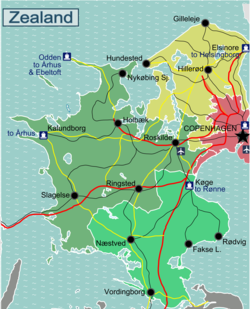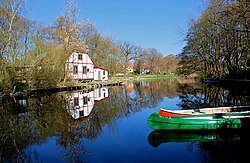- For other places with the same name, see Zealand (disambiguation).
Zealand[dead link] (Danish: Sjælland) is the largest island in Denmark, located between the Island of Funen and the southern tip of Sweden. It is the seat of the capital Copenhagen and home to 2.3 million people.
Regions
edit
| Greater Copenhagen region The densely populated capital region |
| North Zealand The Northern Zealand of Kings with lakes, farmland, lush forests and impressive castles |
| West Zealand |
| South Zealand |
Cities
edit- 1 Copenhagen - Zealand's largest city and capital of Denmark.
- 2 Helsingør - Home of Shakespeare's Hamlet and his Kronborg castle and a well preserved Medieval city centre.
- 3 Hillerød - A castle town set amidst majestic beech tree forests.
- 4 Kalundborg - See the many remaining parts and ruins of the old fortified medieval town.
- 5 Køge - A nice well preserved old city center. The beautiful Vallø manor and the 15 meter Stevns chalk cliffs within easy reach.
- 6 Ringsted - Commercial centre smack on the middle of the islands, with the Danish Tramway Museum on its outskirts.
- 7 Roskilde - World heritage site of Roskilde cathedral, containing the Royal Tombs for the past 1000 years. and the excellent Viking ship museum.
- 8 Slagelse - Discover Denmark's Viking heritage, in the nearby Trelleborg ringcastle, one of only 4 discovered.
Other destinations
edit
- 1 Kongernes Nordsjælland National Park - A national park covering the old hunting grounds of ancient kings.
- 2 Stevns Klint. free.
- 1 Suseå river - One of Denmark's longest rivers, popular with Kayak and Canoe sailors.
Understand
edit
Rumour has it that Zealand was carved out of Sweden (See the ancient legend on your right), and the area where Zealand was carved out from, is now a huge lake which bears some similarity to Zealand. Today a large statue commemorating Gefions feat of ploughing Zealand out of Sweden with her ox cart stands near Kastellet in Copenhagen.
And for many years to follow, Gefion's Zealand was the geographical centre of the Danish Kingdom, as Sweden's three southernmost provinces were then an integral part of Denmark. But the Swedes had their vengeance for Gefion's dirty tricks, though they had to wait a thousand years to taste it. In 1658 they took the eastern part of the Kingdom, in one of the countless wars between the two countries, so that Denmark now ended on the shores of Zealand - hence the rather odd location of the Danish capital.
Much has happened since then, and today nearly half of the population of Denmark lives on the island, where the capital and largest city Copenhagen is also situated - the metropolitan area covers almost the entire north eastern portion of the island, and many people on the rest of the island commute to the capital every day.
The country of New Zealand is NOT named after Zealand, but rather the Dutch province of Zeeland; the Dutch discovered the country in 1642.
Geography
editZealand is quite a large island, at just over 7000 km² (2,715 sq mi), it's among the 100 largest islands in the world. It's flat, but dominated by low rolling hills from moraines left behind from the last ice age - the highest point, Gyldenløves Høj, is only 126 meters (413 ft) above sea level. It's heavily cultivated, but there are some (by local standards) large forested areas in Northern and Western Zealand between Slagelse and Sorø.
The sea south of Zealand is dominated by the three large islands Lolland, Falster and Møn.
Get in
editAlthough densely populated and the seat of the Danish capital, Zealand is an island - in the past 20 years two fixed connections to Jutland and Sweden respectively have been completed, but there are still numerous ferry lines connecting Zealand with the European continent.
By car
editZealand is connected to the European highway network on European routes E20 running between Shannon in Ireland, and St Petersburg in Russia, the E47 between Lübeck, Germany and Helsingborg in Sweden and finally the E55 between Helsingborg and Kalamata in Greece. All of the ferry connections listed below also take on cars. Avoid highways leading into Copenhagen in the morning rush hour between 7 and 9AM, where traffic is notoriously slow for tens of kilometers.
- Storebæltsbroen[dead link] (Great Belt bridge): Most people arrive from Funen (and Jutland), over this impressive 18 kilometer combined road and railway link, on the E20. A one way ticket with a regular sized car is 235 DKK.
- Øresundsbroen (Oresund bridge) this 16 kilometer connection; part bridge, part artificial island and part tunnel is on the E20, and connects Copenhagen with Malmö in southern Sweden. Price of a one way ticket in a regular car is 325 DKK.
By ferry
edit
|
|
|
|
|
By train
editThere are numerous trains connecting Zealand with Funen and Jutland, they all cross the Great Belt fixed link. The Main line departs from Copenhagen twice every hour, usually divided into an Express and an Intercity train, and runs across the length of Zealand with stops in Roskilde, Ringsted, Slagelse and Korsør before crossing the Belt and Funen, and finally branching out when it reaches Jutland. The most important branches are Aarhus/Aalborg running North, Esbjerg running west and finally Sønderborg running south. All cross belt trains are operated by DSB (Danish Railways. International trains depart Copenhagen Central station for Hamburg and Berlin several times per day, stopping in major Zealand cities; Næstved, Vordingborg and Nykøbing Falster on the way. There are also connections between Copenhagen and Ystad, Göteborg and Stockholm in Sweden across the Øresund bridge.
By bus
editBuses between Zealand and Jutland are only marginally cheaper than the train, although there is considerable discounts between Monday - Thursday. The International buses on the other hand offers considerably lower prices than the train. Copenhagen due to its size, acts as the central hub for all bus lines, but the highway buses for Jutland, listed under Copenhagen, makes stops in both Roskilde and Holbæk.
Get around
editBy train
editThe vast majority of regional transportation is done by train, the bulk of it on the 4 main DSB corridors, radiating out of Copenhagen. It is worth noting that the ticketing system changes in Borup and Hvalsø, roughly half way between Roskilde and Holbæk & Ringsted respectively, if you cross these cities "All-Zone" tickets bought in Copenhagen are no longer valid, and you need to purchase train tickets with DSB instead,
- North (Copenhagen-Helsingør)
- West (Copenhagen-Holbæk-Kalundborg)
- South-West (Copenhagen-Ringsted-Korsør)
- South (Copenhagen-Ringsted-Nykøbing Falster)
By bus
editThe regional transportation agency for the whole region is Movia[dead link]. Though the lion's share of long distance transportation in the region are done by train, there are a few important inter-regional routes namely:
- 60 Vordingborg - Maribo (Lolland)
- 62 Vordingborg - Stege (Møn)
- 64 Vordingborg - Bogø - Stege (Møn)
And two express buses[dead link] running mainly in the summer on a non-stop route between Høje Taastrup and the beaches and vacation homes in North-Eastern Zealand:
- 555 Høje Taastrup - Holbæk - Odden (ferry to Jutland)
- 666 Høje Taastrup - Nykøbing Sjælland - Rørvig (ferry to Hundested)
By ferry
editThe most important ferry route on Zealand is between Hundested and Rørvig , crossing the big fjord in the northern part of the island. Many of the smaller islands dotting the sea around Zealand and Lolland are also connected by ferries, check these in the relevant sub regions,
See
edit- Tour the 3 main castles of Zealand; The world heritage sight of Hamlet's Kronborg, Frederiksborg and Fredensborg slot - all within easy reach of each other.
- See the tall white cliffs on Møn and Stevns with sudden 120 meter vertical drops into the sea.
- Discover the world of Vikings in the Viking ship museum in Roskilde and the living history museum of Lejre.
- Møns cliff - Bright chalk cliffs stretching some 6 km, some of the cliffs fall a sheer 120 m to the sea below
- Stevns Cliffs - Another set of dramatic chalk cliffs, and with a cold war fortress bored into the mountain.
- Dig up fossilized remains of a great coral reef in Faxe Limestone Quarry or simply enjoy the view from above.
Do
edit
- 1 Skjoldenæsholm tramway museum (near Ringsted). Open late April to late October, Sa-Su and public holidays, 10am-5pm. Also open Tu-Fr during school holidays, late Jun to early Aug, every day in fall break (week 42). Ride hundred year old trams through a picturesque forest, at the end of the line (Eilers Oak) there is a picnic area with sale of coffee, soft drinks, etc. Also a good starting point for walks DKK 80 for full day, unlimited use of the trams.
- Canoeing on Susåen, Skovridervej 11, 4171 Glumsø, ☏ +45 5764 6144. During the summer it is possible to do an almost 80 kilometers, 3 day canoe trip through beautiful scenery, on this stream that cuts through the middle part of Zealand. Canoe rental from 370 DKK for 1 day.
Eat
editWhile the rest of Denmark is aptly represented in terms of local specialties, the closest Zealand gets is probably the famous smørrebrød, meaning buttered-bread, which has its origins in Copenhagen. These open faced sandwiches of rye bread and butter, comes with as many as 250 different toppings, and are usually finished by some elaborate decorations. Smørrebrød is usually eaten at lunch.
Further south, on the island of Møn the local specialty is bidesild (chewy herring) and is herring that has been pickled in brine over several years, and is served with bread and fat.
- 1 Malerklemmen, Ved Kildepladsen 4, Borup (Exit 34 on E20, third exit in roundabout (left), second exit in next roundabout), ☏ +45 57 52 60 33, info@malerklemmen.dk. Tu-Su in the summer for lunch til late afternoon. Cozy restaurant in the wood, popular with motor cyclists, especially the first Sunday of the month DKK 100, Buffet DKK 180.
Drink
editThere are several breweries dotted around Zealand. Carlsberg & Tuborg, Denmark's major brands used to be produced in Copenhagen but production has now moved to Jutland, but there are several other local brands to choose from
- Faxe Bryggeri, Faxe Allé 1, 4640 Faxe, ☏ +45 5677 1590. The largest brewery on the island, famous for its Pilsner beer.
Go next
editThe Swedish province of Scania is an easy trip by ferry or train from most parts of eastern Zealand. It shares a common history and heritage with the island.

